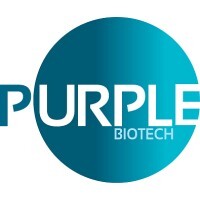Purple Biotech Ltd., a clinical-stage company developing first-in-class therapies that harness the power of the tumor microenvironment to overcome tumor immune evasion and drug resistance, provides clinical updates from its dose escalation portion of the Phase 1/2 study of NT219, a first in class dual inhibitor of Insulin receptor substrate (IRS) 1/2 and Signal Transducer and Activator of Transcription 3 (STAT3) and provides its outlook for planning the next clinical development steps with NT219 for second-line treatment of patients with recurrent and/or metastatic squamous cell carcinoma of the head & Neck (R/M SCCHN).
The Phase 1/2 study (NCT04474470), an open-label, dose escalation and expansion study is designed to assess the safety, pharmacokinetics (PK), pharmacodynamics (PD) and efficacy of NT219 as a monotherapy and in combination with Erbitux® (cetuximab), in patients with R/M SCCHN, or with advanced colorectal cancer. Forty-nine patients were enrolled in five dose levels (3, 6, 12, 24 and 50 mg/kg); 27 in the monotherapy arm, and 22 in the combination therapy with cetuximab. Patients in both cohorts were dosed to the highest NT219 dose level of 50mg/kg. No dose-limiting toxicities (DLTs) were reported in either cohort and NT219 was well tolerated as a monotherapy and in combination with cetuximab.
A dose-dependent increase in drug exposure of NT219 was reported. The exposure achieved at the highest dose level of 50mg/kg was within the efficacy range of the human equivalent dose level as predicted from preclinical models. Inhibition of intra-tumoral IRS 1/2 and STAT3, NT219’s targets, was demonstrated in patients’ biopsies.
Among the four R/M SCCHN patients dosed at 50mg/kg of NT219 in combination with cetuximab, that were evaluable for efficacy, two patients demonstrated confirmed partial response by response evaluation criteria in solid tumors (RECIST) 1.1. Other results from the Phase 1/2 study will be provided at one of the upcoming medical conferences.
“We believe these results are very encouraging given the low response rate to cetuximab as monotherapy in recurrent/metastatic SCCHN patients in the second/third line,” said Ari Rozenberg, M.D, University of Chicago and study Investigator. “While still early, we are excited to see responders at the highest NT219 dose level where we expected the appropriate exposure to be attained, along with evidence of on target treatment effect in patients’ biopsies. I look forward to continuing investigating NT219 and seeing more data in this disease setting with urgent need for improved therapies.”
Treatment options for patients who had progressed following treatment with immunotherapy in first line R/M SCCHN are limited, with mostly cetuximab and chemotherapy currently available. The Company is in the process of designing a Phase 2 study of NT219 in combination with cetuximab in 2L R/M SCCHN. Such a study may evaluate NT219 in combination with cetuximab with or without standard of care chemotherapy following progression after immunotherapy in first line treatment.
Gil Efron, Purple Biotech CEO, added, “I am very satisfied with the observed activity of NT219 in recurrent and/or metastatic SCCHN patients. Due to the dire unmet need in this difficult to treat population, we believe that extending these early results through a robust proof of concept study would be meaningful for patients and for Purple Biotech and may lead us to next development steps. We will continue exploring higher dose optimization while designing our next study. We believe that the good tolerability of NT219 in combination with cetuximab can position this combination as a strong candidate to combine with other agents in 2L SCCHN and to achieve better survival for patients. Additionally, as demonstrated by our preclinical data, we believe that this data could potentially pave the way for development of NT219 in combination with EGFR inhibitors or other agents such as a-PD1 and KRAS inhibitors, potentially unlocking the full potential of NT219.”

